By David P. Diaz, Ed.D.
The nature of truth has both vexed and captivated rational thinkers since ancient times. Socrates once said: “If you will be guided by me, you will make little account of Socrates, and much more of truth.” Aristotle said of the acquisition of truth: “The investigation of the truth is in one way hard, in another easy… no one is able to attain the truth adequately, while, on the other hand, no one fails entirely, but… by the union of all a considerable amount [of truth] is amassed.”

When Jesus stood before the Roman governor, Pontius Pilate, he said, “Everyone who belongs to the truth listens to my voice.” Pilate’s reply was, “What is truth?” Though Pilate’s response was likely cynical and one of condescension or ridicule, he nevertheless asked a valid question whose answer has been a constant preoccupation for mankind, both before and since.
It seems all too common these days for those who claim to be rational thinkers to take refuge behind the concept or notion of relative truth. Example statements are: “All truth is relative,” “There are no absolute truths,” and “What’s true for you is not true for me.” These statements may appear unpretentious and humble, but they can also seem arrogant and ignorant simply because they avoid grappling with important issues like truth, certainty, morality, etc. Those who espouse relativism1 regarding truth, don’t typically appeal to such a position when it comes to questions about gravity, radiation level warnings, and to the price of Apple’s stock. However, it’s an easier path to take to say that “all truth is relative” when one is confronted with truth statements that make one feel wrong, guilty, or uncertain.
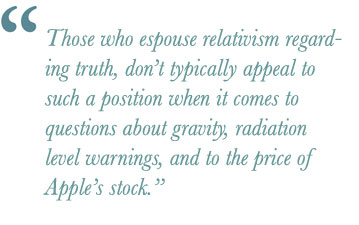 Sometimes, the very same people who argue about their favorite passion or hobby (e.g., politics) as if they know the “real facts,” will then claim truth is relative when the conversation is steered toward a different topic, one in which they are not knowledgeable. On one hand, they marshal their points positively, as if there exists objective fact, truth, certainty and moral right and wrong, but on the other hand—if they are uncertain about the truth of the matter—they will claim “It’s all a matter of perspective,” or “It may be true for you, but not for me.” Though relativism may be convenient, it’s false when it comes to truth.
Sometimes, the very same people who argue about their favorite passion or hobby (e.g., politics) as if they know the “real facts,” will then claim truth is relative when the conversation is steered toward a different topic, one in which they are not knowledgeable. On one hand, they marshal their points positively, as if there exists objective fact, truth, certainty and moral right and wrong, but on the other hand—if they are uncertain about the truth of the matter—they will claim “It’s all a matter of perspective,” or “It may be true for you, but not for me.” Though relativism may be convenient, it’s false when it comes to truth.
In the remainder of this essay, I will show why I believe relativistic statements about truth (and relativism, as a theory of truth) are self-defeating, untrue, or both. I will also explain why I believe truth to be absolute.
What is Truth?
In its simplest form, truth is that which corresponds to reality. Statements (i.e., propositions) that refer to the world as it really is are true statements. If at a particular moment I say, “I am holding my smart phone in my left hand,” I have made a statement about truth. If, indeed, it is my smart phone and it is resting in my left hand, I have made a true statement. If the smart phone belongs to someone else, or if it is resting in my right, not my left hand, or in someone else’s hand, then I have made a false statement.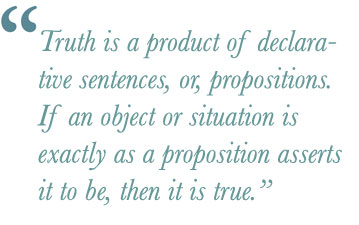
As such, truth is a product of declarative sentences, or, propositions. If an object or situation is exactly as a proposition asserts it to be, then it is true. When I say that, “My lawn is green,” or “The temperature outside is 98°F,” or “God exists,” I have stated propositions that claim to be true. If these statements accurately describe the color of my lawn, the air temperature, or the existence of God, then they are true. If not, they are false.
In some cases, I may be asked to provide reasons for why these claims are true. For some claims, this would be relatively easy and non-controversial. So, for the claim “The temperature outside is 98°F,” I could merely state: “I just heard the weather report on the radio and it reported the temperature to be 98°F,” and that would likely suffice as ample verification of my truth claim. In other cases, a claim may be complex and its truth-value doubted (e.g., “God exists”). In such cases, one must endeavor to bring the weight of evidence to bear on the question (rational argument, logical proof, historical evidence, and/or other types of argumentation).
Certainty v. Certitude
Truth means that there are objective states of affairs that apply to everyone, at all times and places; whether one believes it or not. If there were no objective truths or realities, on what basis would we know that our own beliefs are not false, or at very least delusional?
Truth is objective, but objective certainty2 can be confused with psychological certitude3. It is not enough to give mere psychological assent to a truth claim. Belief doesn’t guarantee truth. Sometimes the certainty of a proposition is relatively easy to demonstrate, like the claim that “I am writing this essay in English.” In this case, the truth claim is easy to ascertain and believe with certainty.
Some people believe the earth is flat. They claim certainty of this truth, but, in fact, they possess mere psychological assurance (certitude). They may have an emotion or feeling of truth, but they lack objective truth (certainty). Though one can believe they know the truth, they may, in fact, be mistaken.
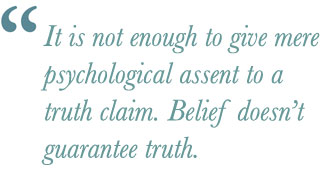 Some assertions as well as their referents may be complex enough that the truth of a given statement may require further demonstration of its truthfulness. And therein lies the problem of establishing some truths. Indeed, there are many statements of truth of which one may not be immediately certain of their truth or falsity. When the understanding or truth of any claim comes into question, the process of demonstrating the truth (or falsity) of the claim may require sustained rational reflection and careful investigation and analysis. The attempt to demonstrate the truth of any given truth claim may utilize logic, universal givens (i.e., first principles), moral principles, scientific evidence, and other evidences. By employing one or more of these methods, the objectiveness of a complex truth claim can often be proven (or disproven) with certainty, or at least to a level of practical certainty (i.e., high level of probability). In any case, the fact that we do not know some truths with absolute certainty does not mean there are no absolute truths.
Some assertions as well as their referents may be complex enough that the truth of a given statement may require further demonstration of its truthfulness. And therein lies the problem of establishing some truths. Indeed, there are many statements of truth of which one may not be immediately certain of their truth or falsity. When the understanding or truth of any claim comes into question, the process of demonstrating the truth (or falsity) of the claim may require sustained rational reflection and careful investigation and analysis. The attempt to demonstrate the truth of any given truth claim may utilize logic, universal givens (i.e., first principles), moral principles, scientific evidence, and other evidences. By employing one or more of these methods, the objectiveness of a complex truth claim can often be proven (or disproven) with certainty, or at least to a level of practical certainty (i.e., high level of probability). In any case, the fact that we do not know some truths with absolute certainty does not mean there are no absolute truths.
There are many things that we do know with absolute certainty. We know our own existence with certainty. We can’t affirm, deny, or doubt our existence unless we first exist to affirm, deny, or doubt it. We know that 3 + 2 = 5 with just as much certainty as we know our existence. Numbers are idealities and, as such, are infinite and distinct from our own existence and from the other things that we know. Once we understand the meanings of numbers, then 3 + 2 will always and everywhere equal 5. We also know that the laws of logic are absolutely true. Like the truth of our own existence, the laws of logic are not deniable or doubtable; they must exist before one can form any mental, verbal, or written argument about their truthfulness. Thus, there are many things that we know absolutely and therefore there are absolute truths.
Unless one is a professional philosopher, one has few occasions to question the truth of the reality around us. Statements about whether my shirt is green or blue, whether there is a steak sitting on my counter, or whether it will rain tomorrow, don’t typically incite a debate. On the other hand, there will always be some truth claims that are disputable and open to doubt. That is the nature of truth and knowledge for finite man. We don’t know all there is to know. But it would be mistaken and misguided to reject absolute truth because we lack conclusive evidence that some things are true.
Truth is Not Relative
Anyone who asserts that all truth is relative is making a self-defeating statement. For in claiming all truth is relative, one is in fact making an absolute truth claim (i.e., that all truth is relative). And, since it is a universal assertion, it is falsified by just one actual counter-example.
Relativism is not only self-contradictory in claiming that all truth is relative, but even by claiming that only some truths are relative, it shows itself to be merely another relative claim that is not binding on the rest of us. Thus, relativism—as a universal claim—is inadequate for explaining the nature of truth.
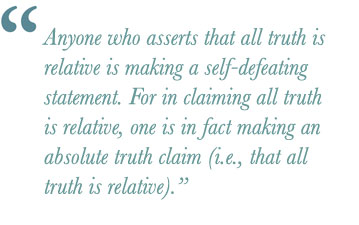 All truth cannot be relative because that very claim implies an appeal to absolutes. For example, someone may say, “Well, that may be true for you, but not for me.” My response would be: “Is your claim true for everyone?” A “yes” response would be self-defeating because it asserts an absolute truth (i.e., that something is true for everyone) and is therefore incoherent. On the other hand, if the response is “no” then it means there are absolute truths and we needn’t pay much attention to one’s “truth is relative” claim. And, if the answer is “I don’t know” then one shouldn’t have made the claim to begin with because it was stated in the form of a truth proposition, which requests a “yes” or “no” (i.e., true/false) response.
All truth cannot be relative because that very claim implies an appeal to absolutes. For example, someone may say, “Well, that may be true for you, but not for me.” My response would be: “Is your claim true for everyone?” A “yes” response would be self-defeating because it asserts an absolute truth (i.e., that something is true for everyone) and is therefore incoherent. On the other hand, if the response is “no” then it means there are absolute truths and we needn’t pay much attention to one’s “truth is relative” claim. And, if the answer is “I don’t know” then one shouldn’t have made the claim to begin with because it was stated in the form of a truth proposition, which requests a “yes” or “no” (i.e., true/false) response.
There are those who cite examples of truths that may only be true for some. Like the statement: “I’m feeling warm.” Perhaps others in the room don’t feel warm. Does that mean that truth is relative? Of course not! At the moment the statement was uttered, it was true everywhere and for everyone that the person who made the statement felt warm. That statement, at that moment in history, corresponded to the facts about the person who made the statement and was therefore absolutely true. Another person in the room at the same moment could have said: “I’m freezing!” That statement would also be true. Both statements taken together do not show relative truths, they show absolute truths that correspond to the reality for each individual. Each truth is absolute for all people and at all places because regardless of how any other person is feeling regarding the heat/cold, it will not change the facts of reality for those people who delivered their truth statements at a given place and moment. How a given person feels about the temperature in a room is based on their perceptions, but the truth of the matter is not relative. How an individual perceives the temperature is based on objective parameters: heart rate, metabolic rate, stress levels, hormone levels, blood pressure, air temperature, ground temperature, etc. Hence, it was absolutely true that the person who made the claim felt warm. Consider a different proposition: “It’s hot in this room. It’s got to be at least 80°F.” In this case, we have an objective claim that is more easily assessed as true or false because it provides us with a clear standard to falsify the claim (i.e., “hot” is defined as “at least 80°F”).
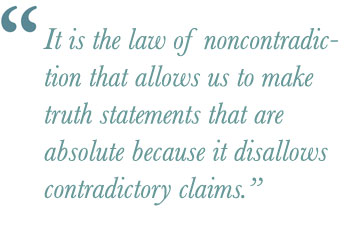
Let’s say that a person from Palm Springs is visiting Alaska and she makes the statement: “It’s cold in Anchorage, but it’s hot in Palm Springs.” Those are not contradictory statements. They can both be true, and it would make no difference where you might be located at that moment, or whether you believed the truth of the matter. (Naturally, one would need to define the notion of both “cold” and “hot.”) Thus, the outcomes of propositions are true or false for all people and in all places.
The following proposition is a true statement: “A truth-statement cannot be both true and not true at the same time and in the same context (i.e., law of noncontradiction).” This basic law of logic is true for everyone, at all times, and in all places. Indeed, it is the law of noncontradiction that allows us to make truth statements that are absolute because it disallows contradictory claims. If I own a certain book made entirely from paper, then it is not possible that my entirely paper book can be constructed entirely from paper and entirely from leather at the same time. Therefore, the statement: “My book is made from paper” is true, and the contrasting statement “My book is made from leather” is false.
The law of noncontradiction also applies to sets of statements: 1.) I threw the ball to John 2.) John caught the ball. 3.) John threw the ball back to me. If any of the statements in that set negates the truth of any other statement in the set, then we cannot say the set of statements is true. So, for example, the set: 1.) I didn’t throw the ball to John. 2.) John caught the ball. 3.) John threw the ball back to me, is false because the first premise negates the other two premises (i.e., John cannot catch the ball, or throw it back to me if I didn’t throw the ball in the first place).
Truth Does Not Change
Some may say, “What is true today, may not be true tomorrow.” This is false. Truth does not change, even though we may be unaware of the fact. The earth has never been flat, but in times past some thought it to be so. The truth did not change from the world being flat to the world being round; there was only one truth, though more than one belief about that truth. This is why one’s beliefs do not necessarily determine what is true. Truth is not determined by a majority vote, nor does sincere belief serve as a valid test for truth. Just because I sincerely believe the sun won’t rise tomorrow doesn’t mean that it won’t. What if I sincerely believe that sincere belief does not make something real? Both views cannot be true.
The claim that my daughter’s height at 4 years of age was 3 feet 6-inches, and at 6 years it was 3 feet 10 inches, doesn’t show that truth changes. The coordinates (time, place and circumstances corresponding to a truth claim when uttered) may have changed, but not the truth of the proposition. The truth of the matter has not changed; only the coordinates have changed. So, at 4 years of age, my daughter was 3 feet 6 inches tall. That statement is just as true today as it was then. Besides being true at that exact time, it was true always and everywhere because, based on those coordinates, the truth is absolute and unchanging.
The proposition that my fingertips are at this moment touching my computer keyboard is true and it is true for all people in all places, whether they are here to see it, or whether they even care about the truth of it.
Truth is Not Merely What Works
The claim that “truth is whatever works,” is the relativistic position called pragmatism.4 While it may be true that truth works in most cases, it would be ill advised to say, “Because something is practical, useful or self-serving, it is true.” The problem with pragmatic theory is that it relativizes truth to what is useful to any given individual at any given time. Therefore, if truth is merely what works, one could never say that any statement is necessarily true, only that it works. However, not all successes are true and not all failures are necessarily false. So, even if something works, the truth of the statement(s) is not settled, but is still open to doubt, even after the results are reached.
What if “what works for me” is to rob you at gunpoint to satisfy my financial needs? Is the proposition “It is morally right to rob someone to satisfy one’s financial needs” true? Or what about the opposite proposition, “It is not morally right to rob someone to satisfy one’s financial needs.” Is the truth or falsity of these opposing claims decided merely on what works for the individual?
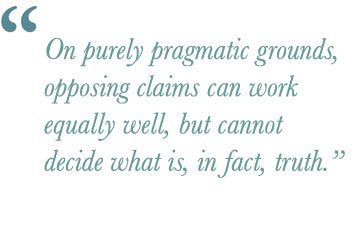 According to the pragmatist, the proposition “God exists” can be considered true if believing that God keeps watch over an individual helps one to cope with despair. In other words, the proposition “God exists” is true because it works for that individual. On the other hand, the same truth claim may not be considered useful for the next person who may then claim, “God does not exist.” Therefore, for the pragmatist, the same proposition can be both true and false at the same time. This case clearly shows the insurmountable problem with pragmatism: Not only can one not speak coherently about any truth claim, but the pragmatist has to disclaim one of the fundamental laws of logic (law of noncontradiction) by asserting that a proposition can be both true and false at the same time and in the same sense. Thus, on purely pragmatic grounds, opposing claims can work equally well, but cannot decide what is, in fact, truth. If propositions can be both true and false at the same time, it would be useless to talk about truth or certainty.
According to the pragmatist, the proposition “God exists” can be considered true if believing that God keeps watch over an individual helps one to cope with despair. In other words, the proposition “God exists” is true because it works for that individual. On the other hand, the same truth claim may not be considered useful for the next person who may then claim, “God does not exist.” Therefore, for the pragmatist, the same proposition can be both true and false at the same time. This case clearly shows the insurmountable problem with pragmatism: Not only can one not speak coherently about any truth claim, but the pragmatist has to disclaim one of the fundamental laws of logic (law of noncontradiction) by asserting that a proposition can be both true and false at the same time and in the same sense. Thus, on purely pragmatic grounds, opposing claims can work equally well, but cannot decide what is, in fact, truth. If propositions can be both true and false at the same time, it would be useless to talk about truth or certainty.
Pragmatic claims for truth are not sufficient to determine truth with certainty. Truth corresponds to reality and if you make a statement that is correct about reality, then you have made a true statement. Whenever we tell someone to “check the facts,” we are in fact requesting that they test each truth statement by how it corresponds with the real world. As such, propositions often require rational verification to ensure that the results of truth statements are coherent and fit the evidence.
To be sure, truth can work toward a person’s desired end, but if it doesn’t, that is not, in itself, sufficient reason to think it false. Any given proposition is true or false based on how it corresponds to reality.
Truth is Not Unknowable
Some people claim that truth about reality is unknowable. Agnostics are famous for claiming: “One can know nothing about reality.” The simple response is: “How do you know that?” It is a self-defeating claim because, in order to claim that one can know nothing about reality, one has to claim they know something about reality (i.e., that one can know nothing about it). The fact is, we do know some things absolutely, therefore some statements are true and some statements are false.
Truth Statements May Require Specificity
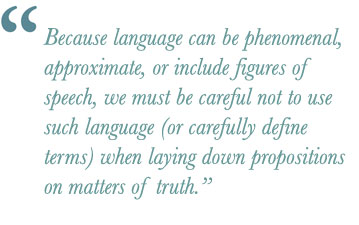 While the proposition “The grass in my front yard is green” would not normally evoke a second thought, one could quibble that the grass is closer to Forest green than Kelly green, or is Jungle green rather than Jade green. Ultimately, while my grass may be a particular shade of green, it is still green and not blue or red. When I go to the physician, the nurse typically asks me my height and weight. I usually tell her I’m 5’9,” but I’m really 5” 9 ½”. I also say I’m 170 pounds, when I’m really 168 pounds. Rounding numbers and talking in approximations is common and totally acceptable in our everyday conversation, but may not be helpful when making truth claims. Further, the use of figures of speech and metaphors are very common in popular speech (e.g., “They came from the four-corners of the earth,” or “I’ll see you tomorrow at sunrise” or “sunset”), but do not necessarily represent the same accuracy as is needed for presenting a claim or statement of truth. Because language can be phenomenal (i.e., pertaining to appearance), approximate (e.g., rounded numbers, etc.), or include figures of speech, we must be careful not to use such language (or carefully define terms) when laying down propositions on matters of truth. If there is a likelihood of dispute or doubt about a truth claim, it is better to be more precise in the language that is used and to qualify words and statements appropriately. In this manner, the process for determining the truth of a proposition will be more easily understood and the manner of resolution more efficient.
While the proposition “The grass in my front yard is green” would not normally evoke a second thought, one could quibble that the grass is closer to Forest green than Kelly green, or is Jungle green rather than Jade green. Ultimately, while my grass may be a particular shade of green, it is still green and not blue or red. When I go to the physician, the nurse typically asks me my height and weight. I usually tell her I’m 5’9,” but I’m really 5” 9 ½”. I also say I’m 170 pounds, when I’m really 168 pounds. Rounding numbers and talking in approximations is common and totally acceptable in our everyday conversation, but may not be helpful when making truth claims. Further, the use of figures of speech and metaphors are very common in popular speech (e.g., “They came from the four-corners of the earth,” or “I’ll see you tomorrow at sunrise” or “sunset”), but do not necessarily represent the same accuracy as is needed for presenting a claim or statement of truth. Because language can be phenomenal (i.e., pertaining to appearance), approximate (e.g., rounded numbers, etc.), or include figures of speech, we must be careful not to use such language (or carefully define terms) when laying down propositions on matters of truth. If there is a likelihood of dispute or doubt about a truth claim, it is better to be more precise in the language that is used and to qualify words and statements appropriately. In this manner, the process for determining the truth of a proposition will be more easily understood and the manner of resolution more efficient.
Conclusion
The world of so-called relative truth is beset by a host of contradictory claims. If one person claims “God exists” and another person claims “God does not exist,” then we have two contradicting claims that cannot both be true (unique definitions of God notwithstanding).
If all truth is relative, then no one could ever be wrong because no truth claim could ever be false; any truth claim could be both true and false at the same time. I would be right, even when I’m wrong, which poses a nonsensical view of the world. There could be neither learning nor education because each requires the movement from a condition of not having the truth, to having it, and then teaching it.
Those who claim to hold rational beliefs must acknowledge the absoluteness of truth. For in the face of two different claims to truth, both cannot be true, although both may be false (i.e., the truth may be entailed in a different claim). On the other hand, if the competing claims represent the only possibilities (i.e., God exists, or not), only one claim is true, and the other must be false.
Rational beliefs require good reasons and those reasons are developed through evidence of truth; not from shifting, or contradictory concepts of truth, but from truth that is absolute.
The label “relativism” has been attached to a wide range of ideas and positions, which may explain the lack of consensus on how the term should be defined (Stanford Encyclopedia of Philosophy). While some see relativism as the essence of tolerance and the exemplar of open-mindedness, in my judgment it is fundamentally incoherent and represents uncritical intellectual permissiveness. This belies not only rationality, but also hinders any attempt to form rational beliefs.
About the Author
David P. Diaz, Ed.D. is the publisher and owner of Things I Believe Project. An educator and author, Dr. Diaz has a lifelong love of learning. His pen name (aka “Don Quixote”) comes from his love of chasing windmills (i.e., truth and other ideals) and his penchant for tongue-in-cheek humor: “Don Quixote was developing his arguments in such an orderly and lucid way that for the time being none of those listening could believe he was a madman.”
Footnotes
- Relativism is the view that truth and falsity, right and wrong, standards of reasoning, and procedures of justification are products of differing conventions and frameworks of assessment (e.g., local cultural norms, individual standards) and that their authority is confined to the context giving rise to them (Stanford Encyclopedia of Philosophy).
For some, it is a theory that knowledge is relative to the limited nature of the mind and the conditions of knowing or, it is a view that ethical truths depend on the individuals and groups holding them” (Merriam-Webster). In other words, relativists claim that both knowledge and truth are relative and are determined by our own limited knowledge and understanding, or are merely a function of individuals, societies and/or cultures.
- Certainty is the confidence that something is true. This is typically achieved as a result of the correct apprehension or understanding of a state of affairs.
- Certitude is the subjective notion that something is true, even with respect to statements that are problematic or false. Mere assent or belief does not necessarily bring objective certainty.
- Pragmatism is a philosophy that makes the test for truth the observed practical consequences that are seen when a hypothesis has been drawn out to concrete experience. Truth, for the pragmatist, is not what is consistent or what is empirically verified, but what is experientially workable.